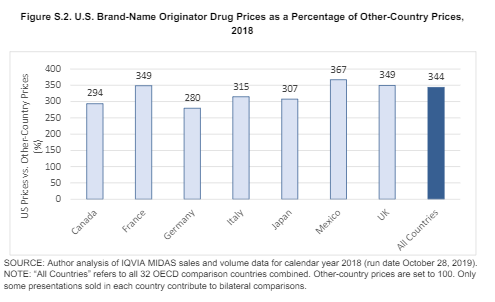RAND researchers recently published a research brief that found that prescription drug costs in the United States continued to rise and that the United States spends more per capita on prescription drugs than other Organisation for Economic Cooperation and Development (OECD) nations do.
In conducting the research, RAND researchers used 2018 prescription drug volume and price data to compare United States drug prices with those in 32 other OECD nations. The researchers found that United States prices for drugs in 2018 were 256 percent of those in the 32 OECD comparison countries combined. The researchers also compared the data overall and for specific categories of drugs (i.e., brand-name and generic medications) and found that United States prices were 350 percent of those in the comparison countries combined.
How much higher prices were varied on individual countries, and when researchers compared individual countries to the United States, United States prices ranged from 170 percent of drug prices in Mexico to 779 percent of drug prices in Turkey.
RAND also noted that it is the brand-name drugs that seemed to drive the disparity, as United States prices for branded drugs were 344 percent higher than other OECD countries. However, when it came to unbranded generics, United States prices were lower than those of other countries (84 percent of prices in the comparison countries combined).
Unbranded generics represent 84 percent of volume in the United States, compared with 35 percent of volume for the other OECD countries in the study. Although different methodological decisions and assumptions did change the magnitude of results, we found a consistent pattern of considerably higher overall drug prices in the United States than in the comparison OECD countries.
Additionally, United States prices still remained nearly double those of other countries after accounting for rebates and other discounts paid by drug companies in the United States.
RAND concluded that some of the recent policy proposals that suggest using prices in other countries as a tool to control prices in the United States might lead to cost savings, especially when it comes to branded drugs. However, RAND was quick to note that there are many factors that need to be considered when developing and implementing drug price policies, indicating that this study should not be the sole reason for new drug pricing policies. RAND also noted that future research in this vein should compare prices for additional categories of drugs, such as biosimilars.





